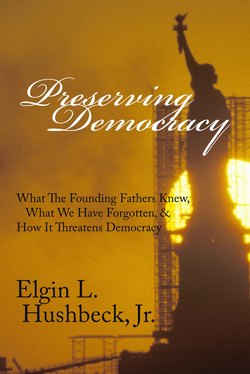Читать книгу Preserving Democracy - Elgin L Hushbeck - Страница 9
На сайте Литреса книга снята с продажи.
ОглавлениеIntroduction
The Last Best Hope
Fellow-citizens, we cannot escape history. We of this Congress and this administration, will be remembered in spite of ourselves. No personal significance, or insignificance, can spare one or another of us. The fiery trial through which we pass, will light us down, in honor or dishonor, to the latest generation. We say we are for the Union. The world will not forget that we say this. We know how to save the Union. The world knows we do know how to save it. We – even we here – hold the power, and bear the responsibility. In giving freedom to the slave, we assure freedom to the free – honorable alike in what we give, and what we preserve. We shall nobly save, or meanly lose, the last best hope of earth.
Abraham Lincoln1
A merica today is at a crossroads, where many are unclear where we have come from or where we are going. Based on the most recent presidential election the only clear message is that people are unhappy and want change. But change to what? That is not so clear.
The challenges facing the country are both numerous and large. Internationally there is the global threat of radical Islam, the reemergence of Russia as an adversary and the growing threat of China. There is an unstable government in North Korea with nuclear weapons, the looming prospect that Iran will shortly acquire them, and the real threat that if they acquire them, they will use them. Then there are all the domestic problems, the bailouts, the housing crisis, the economy, unemployment, health care costs, energy policy, and the environment, to name just a few.
But America faces even deeper problems, problems that threaten democracy itself. These problems don’t always get the coverage of the more immediate problems but that does not change the fact that they are both real and very serious.
The basic premise of this book is that democracy is an unworkable system of government that is doomed to fail, dissolving into tyranny– at least that has been the opinion of almost all the major thinkers, from Plato and Aristotle forward. The Founding Fathers understood these criticisms when developing the system of checks and balances that has worked so well. Yet, since then, we have made repeated changes to government, some minor, some major. As we make changes, how many of us really understand the key weaknesses of democracy? Are the changes we make simply removing deadwood that is no longer needed in the 21st century, or are we removing key foundational supports, key checks and balances? How would we know the difference?
This is the central question of this book. Rather than just an abstract discussion of political philosophy, the book looks at this subject by focusing on a number of key issues of importance today such as Taxes, The Rule of Law and Voting to name a few. Each chapter looks at a current trend that if left unchanged, could cause the American democracy to fail, just as all the earlier attempts at democracy have failed.
While I have strongly held views in all these areas, I have tried to avoid being overtly partisan. Given that it is impossible to move beyond pure theory without citing specific examples, and examples automatically risk partisanship, some will undoubtedly be critical of my lack of success in this area.
Still, I have at least attempted to remain balanced in my presentation, choosing to skip some examples that might havemade a stronger case because they were too clearly partisan, and using others because they were more balanced. In all the examples, I have kept party affiliation to a minimum and focused on the policies and problems, rather than the people and parties. Some of the examples are not as recent as they could have been, simply because older examples are easier to treat more dispassionately and objectively, for ‘the heat of battle’ has subsided a bit. I did, however, include some recent examples, simply so the book would not be dated.
Finally, the main focus of this book is on the problems that face our democracy. It is my firm belief that these problems are not only solvable, but for many, the biggest danger is the ignorance of these problems. If there was a general consensus on the nature of the problems, the solutions would follow fairly naturally.
Because of this, I have focused on the problems themselves rather than on possible solutions. While each chapter ends with a What can be Done section, I have not put very much detail into that part of the discussion. In fact, at one time I was not even going to include any potential solutions at all, but decided that a discussion of the problems without any mention of possible solutions could leave the reader with a sense that we are doomed. While I believe these problems are very serious, that is not my belief.
Still the brief nature of the solutions sections opens them up to the criticism of superficiality. I can only ask the reader to remember that these are offered as a first step toward a solution to these problems, not the final word. Ultimately, these problems must be solved through the democratic process. As we will see in the first chapter, attempts to fix these problems by imposing solutions is doomed to fail, for once the person or body imposing the solutions relinquishes power, the imposed solutions will be abandoned.
The only true solution must be a democratic solution, where the problems are debated, solutions suggested, pros and cons ofeach are considered, along with their ramifications, and then the people must decide how we as a country will proceed. Anything short of this would be self-defeating.
